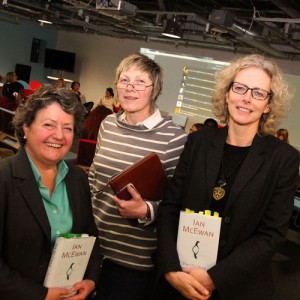There remains a perception in some quarters that twitter and other forms of social media exist mainly to celebrate the trivial and elevate the irrelevant – reductive debasers of meaningful conversations. But this simply isn’t true and certainly not for social workers!
Social media’s greatest achievement has been its connectivity, the ability to share and respond to conversations, ideas and observations instantly and, in so doing, foster online communities of like-minded people. Twitter in particular has demonstrated this capacity to engage and educate – in surprising and unexpected ways.

A case in point: Isabelle Trowler, the Chief Social Worker for Children and Families and I recently visited the University of Central Lancashire (UCLan) to learn more about a virtual book club. The club has grown from small beginnings in Preston to become a national online teaching project involving multiple student bodies from across the country.
I came across the social work book club last summer. I was impressed by the way it united students and social workers in discussion of themes and issues relevant to their work.
The club began two years ago in more traditional guise, attended by a small group of social work students. Together with their tutor Amanda Taylor, they would meet regularly to discuss written works of interest.
The intention was to create an open and engaging learning environment – something different, but additional to the more formalised seminar/lecture structure. By taking the group online this approach has quickly evolved and gained wide approval.
As social workers, being open minded and alert to the opinions and concerns of others, is simply part of what we do. Twitter and other online forums are an extension of this approach - allowing us to express ideas, signpost information and learn from our peers.
So far, students from UCLan, Lancaster University, Glasgow Caledonian University, Cardiff University, the University of Northampton, Queen’s University Belfast and the University of Bradford have joined book club sessions using the hashtag #swbc.
The involvement of authors, practitioners and academics in online conversations and live video streaming has since proved a seductive draw for those seeking insight beyond campus confines! And interest is growing beyond these shores too, with students and social workers from abroad now joining what is fast becoming an international movement. Proof, if proof is needed, that social work is a truly global profession.
I’m keen to know if other universities and colleges are doing anything similar, so please do post your comments at the bottom of this blog and share your experiences of online engagement with other social workers.
In the meantime, why not check out the UCLan @SWBookClub? Your curiosity will definitely be rewarded.
4 comments
Comment by Sue Gardner posted on
Really enjoyed book club and the opportunity to discuss practice in such a positive forum and supportive environment - one of the things that first attracted me to book club was the space it created to interact with students from across all year groups, academics and practitioners - the use of social media has enhanced my learning and connectivity with people equally passionate about social work and the people we work with - many thanks Lyn for taking the time to come and blog
Comment by @amltaylor66 posted on
And it is now going on in social work teams across the UK:
@LauraAPitman Reflective supervision 8/52 with team & et al has been altered to form a #SWbookclub - first novel @MarkNeary1 'Get Steven Home'.
Very exciting #swbk
Comment by Pansy potter1 posted on
It's good that there are people who defend and help children and adults with health issues name but a few
Mental health which is grossly underfunded , autism which should be diagnosed early ,
I'm 81 fortunately don't have these problems but have a lot of health issues which in my opion aren't addressed
Comment by Lyn Romeo posted on
Thanks for your comments. I am trying to raise the profile of social work in mental health services and also in working with people with autism. We are planning to publish practice guidance for social work and autism in the autumn.